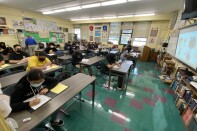This story is free to read because readers choose to support LAist. If you find value in independent local reporting, make a donation to power our newsroom today.
The ‘science of reading’ won’t be required in California schools, at least for now

A bill that could reshape literacy education in California elementary schools cleared a major hurdle in the Legislature this week after dueling sides reached a compromise that provides funding for phonics-based instruction but stops short of requiring it.
The compromise between English learner advocates and those who back the so-called “science of reading” or "evidence-based" approach provides funding and support for phonics-focused instruction, but doesn’t require schools or teachers to participate.
Still, the legislative language, which was added to an existing bill, represents an important milestone in the fight over how schools teach children to read. For years, arguments over phonics have stalled progress on literacy policy, even as statewide reading scores have remained stubbornly low.
“It’s exciting for California. A lot of work went into this, and it shows opposing sides can come together and find solutions,” said Marshall Tuck, director of EdVoice, an education nonprofit. “This will be a really good thing for California kids.”
The bill, sponsored by Assembly Speaker Robert Rivas, Assemblywoman Blanca Rubio, a Democrat from West Covina, and Assemblyman Al Muratsuchi, a Democrat from Torrance, requires the state to provide training for teachers and instructional materials centered on phonics-focused literacy instruction, which includes vocabulary, comprehension, the ability to sound words out and other literacy basics. The materials and training must also address the specific needs of English learners, who make up about 18% of the state’s 5.8 million K-12 students.
“We recognize the role of the Legislature in proposing solutions to improve literacy that uplifts the unique needs of multilingual learners and honors their home languages and cultures — which is why we are proud to support AB 1454,” said Martha Hernandez, director of Californians Together, an English learner advocacy group, in a statement.
Tuck said he’s confident most schools will opt to use the new instructional materials and send their teachers to learn the ins-and-outs of teaching phonics, because they’ll want to take advantage of the funding. He said he’s not overly fazed by the fact that the material isn’t required.
Previous opposition
Previous bills to require a phonics-based approach have died, in part because not everyone agrees that phonics is the best way to teach students whose first language isn’t English. Hernandez’s group has argued that those students need an approach that gives equal weight to vocabulary and oral language development in addition to phonics.
The California Teachers Association, the state’s largest teachers union, has fought reading instruction mandates in the past, saying teachers — not legislators — are in the best position to assess the needs of individual students, and they need maximum flexibility in the classroom. The union has so far been neutral on this bill.
Research has shown that most students learn to read through explicit instruction focused on sounding words out, alongside lessons in vocabulary and comprehension. The other primary approach emphasizes sight reading, in which students memorize whole words and piece together meaning through context.
Nearly 40 states have required phonics-based reading instruction in recent years. Some school districts in California, including Los Angeles Unified, the largest district in the state, already use curricula that’s focused on phonics. But about 80% of districts don’t, according to research by the California Reading Coalition, a literacy advocacy group.
Stalled reading scores
California’s reading scores were steadily climbing before the pandemic, but fell during remote learning and have stalled since then. Almost 60% of third graders weren’t reading at grade level last year, with some student groups, including Black and low-income students, lagging even further behind. By fourth grade students should be reading well enough to easily understand content, according to the state’s literacy standards.
The bill, scheduled for a hearing today, was originally introduced in February but its primary focus was on school heating, air conditioning and ventilation systems. Advocates tacked on the literacy component this week, which is detailed in the bill analysis and will likely be incorporated into the bill language later this week. It replaces a previous bill, also sponsored by Rubio, that died last week.
Because the bill is sponsored by the Assembly speaker, it’s expected to pass the Assembly. Any bill that costs money may face an uphill battle in the current economic climate, but Gov. Gavin Newsom has supported literacy efforts in the past.
This article was originally published on CalMatters and was republished under the Creative Commons Attribution-NonCommercial-NoDerivatives license.










